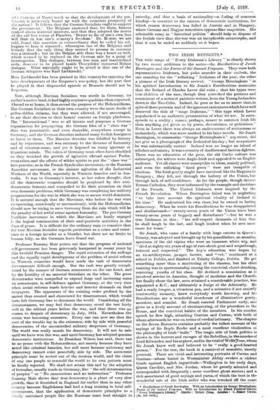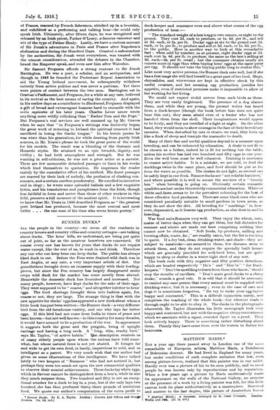TWO IRISH REPRINTS.•
THE wide range of " Every Irishman's Library " is clearly shown ' by two recent additions to the series—the Recollections of Jonah Barrington and the Poems of Sir Samuel Ferguson. They were both representative Irishmen, but poles asunder in their outlook, the one standing for the " rollicking " Irishman of the past, the other a pioneer of the Irish literary revival. " George Birmingham " in his spirited Introduction to Sir Jonah's Recollections maintains that the Ireland of Charles Lever did exist ; that his types were true children of the race, though they provoked the protests and resentment of a series of patriotic writers, from the Young Irelanders down to the Neo-Celts. Indeed, he goes so far as to assert that, in spite of these protests and of the ignorant caricatures which have well deserved the title of " stage Irishman," " this type which Lever popularized is an authentic presentation of what we are. It corre- sponds to a reality ; comes, perhaps, nearer to common Irish life than anything yet given us by poets, rhetoricians, or politicians." Even in Lever there was always an undercurrent of seriousness or melancholy, which was more marked. in his later novels. Sir Jonah Barrington, to-summarize "George Birmingham's" • argnment, did not give us a photograph of the Ireland of his day ; but as apainter he was substantially correct Ireland was no longer an island of scholars and saints ; it was a country of duellists and faction-fighters. There was no education of the poor, the old Gaelic culture was submerged, the writers were Anglo-Irish and appealed to an English audience. Yet all classes were susceptible to ideas, mainly political, and even the rollicking " hard goers " were not incapable of idealism. The Irish gentry might have survived like the Magyars in Hungary ; they fell, not through the bribery of the Union, but through lack of self-confidence. As for the people, though devout Roman Catholics, they were influenced by the example and doctrines of the French. The United Irishmen were inspired by the French Revolution. Where Barrington failed was in neglecting " to take into account the spiritual vitality of Ireland in his time." He understood his own class, but he owned to hating democracy. When he wrote his Recollections he was disappointed and disillusioned—" twenty-seven years of the Union have been twentyereven years of beggary and disturbance "—but he was a true Irishman in this : " his self-respect demands of him that he shall laugh to the last, and laugh loudest when he sees most cause for tears."
Sir Jonah, who came of a family with large estates in Queen's County, was adopted and brought up by his grandfather, an amazing specimen of the old regime who wore an immense white wig, and " died at eighty-six years of -age of rum-shrub gout and usquebaugh, beloved and respected." The boy's education was begun by an ex-artilleryman, gauger, farrier, and "vet," continued at a school in Dublin, and finished at Trinity College, Dublin. He got something more than a smattering of the classics, but his chief training was in sportsmanship among the convivial, claret-drinking, roistering youths of his class. He declined a commission as it involved service in America, thought of medicine.and the Church, but finally chose the.law, soon attained a considerable practice, was appointed a K.C., and ultimately a Judge of the Admiralty. He had a ready tongue, s vivacious pen, and a retentive if not entirely trustworthy memory, knew everybody worth knowing, and his Recollections are a wonderful storehouse of illuminative gossip, anecdote, and scandal. Sir Jonah entered Parliament early, and gives us a lively account of electioneering, of the procedure in the House, and the convivial habits of the_members. In his maiden speech he flew high, attacking Grattan and Curran, with both of whom afterwards he was on terms of cordial intimacy. The chapter on the Seven Baronets contains probably the fullest account of the sayings of Sir Boyle Roche and a most excellent vindication of the philosophy of Irish" bulls." The tragic side of Irish politics is shown in the horrors and ravages of the Rebellion, in' he nrarder of Lord Kilwarden and his nephew, and in the trial of -Wolfe:Tone, whom Sir Jonah knew well and believed to be " really a good-hearted person." For the rest, the book is a carnival of anecdote, -mostly personal. There are vivid and interesting portraits of Curran and Grattan—whose burial in Westminster Abbey revokes .a violent tirade against English ingratitude—Wellington in his early days, Queen Caroline, and Mrs. Jordan, whom he • greatly admired and corresponded with.frequently ; some excellent ghost stories; and a rich assortment of good sayings and yarns, of which the best is the wonderful tale of the Irish sailor who was wrecked off the coast
• Recollections of Jonah Barrington. With an Introduction by George Birmingham. Poems of Sir Samuel Ferguson. With an Introduction by Allred Pereeval Graves. " Every Irishman's Library." Dublin : Talbot Press. London : Maher Unnin. (Se. net each.)
of France, reseuedhy French fishermen, stitched up in .a: bearskin, and exhibited' as a performing and talking bear—he could only speak Irish. Ultimately, after fifteen days, he was recognized and released 1:ty- an Irish priest, Father O'Leary, a famous raconteur and wit of the type of Father. Healy. Lastly, we have a curious account of Sir Jonah's: adventures in Paris and France after Napoleon's abdication and during the Hundred Days. Granted a safe.00nduct by the authorities, Sir Jonah went everywhere, was treated with the utmost consideration, attended the debates in the Chamber, heard the Emperor speak, and even saw him after Waterloo.
Sir Samuel Ferguson affords a strong contrast to Sir Jonah Barrington. He was a poet, a scholar, and an antiquarian, and though in 1848 he founded the Protestant Repeal Association to aid the Young Ireland movement, he subsequently withdrew entirely from active politics and was never a partisan.. Yet there were points 'of contact between the two- men. Barrington sat in Grattan's Parliament, and Ferguson, for a while at any rate, believed in its revival as the best means of saving the country. And again, in his earlier days as a contributor to Blackwood, Ferguson. displayed a gift of broad and extravagant humour hard to reconcile with the untie aaptentius of his later years. Charles Lever never wrote anything more wildly rollicking than " Father Tom and the Pope." But Ferguson's real services are well summed up by Mr. Graves when he says that " in Ferguson's writings was decisively begun the great work of restoring to Ireland the spiritual treasure it had sacrificed in losing the Gaelic tongue," In his heroic poems he was wiser than his generation, for while drawing from purely Irish sources, in Mr. Yeats's phrase he took the great poets of the world for his models. The result was a blending of the Ossianic and Homeric styles. He attained to an epic breadth, 'dignity, and virility ; he had both atmosphere and strength. But he was wanting in self-criticism, he was not a great artist or a metrist. There are few memorable detached passages or lines in his works which lend themselves to quotation. He impresses the reader mainly by the cumulative effect of his method. His finest passages are marred by their lack of melody, the profusion of clashing con- sonants, and a certain careless ponderosity. He excelled in invective and in elegy ; he wrote some splendid ballads and a few exquisite lyrics, and his translations and paraphrases from the Irish, though less faithful in form and metre than those of other workers in this field, preserve a -full measure of the ancient spirit. It is interesting to know that Mr. Yeats in 1886 described Ferguson as " the greatest poet Ireland has produced, because the most central and most Celtic . . . the one man of his time who wrote heroic poetry."











































 Previous page
Previous page